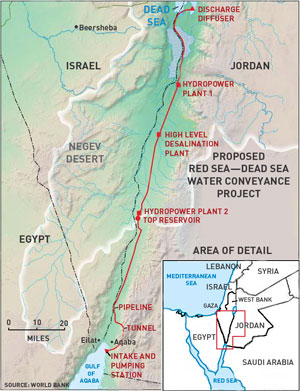

After more than five years of official study at a cost of at least $16 million, a team of World Bank consultants are close to completing work that, so far, supports building an estimated $10-billion water pipeline project in Jordan. Set to pump water from the top of the Red Sea into the shrinking Dead Sea, the project would also include linked powerplants to boost energy supply for the region.
But three just-released bank reports that outline draft conclusions as to the project's feasibility, environmental impacts and alternatives have evoked both support and strong opposition from public officials and environmental groups in hearings last month in Jordan, Israel and the Palestinian territories.
The studies are being done on behalf of the territories and the two countries and are financed by eight donor nations: France, Greece, Italy, Japan, South Korea, the Netherlands, Sweden and the U.S.
The project is also aimed at cementing cooperation, as a "symbol of peace" in the turbulent region, according to one of the reports.
After evaluating public comment, consultants are set to complete the study process by June 30, Alexander McPhail, an environmental engineer and project team leader, told ENR.
While the World Bank study began in 2008—and earlier analyses of the project's feasibility date to the 1990s—McPhail says the next steps for the project are unclear.
The project, called the Red Sea-Dead Sea Water Conveyance, involves the annual transfer of 2 billion cubic meters of water from the Gulf of Aqaba to the Dead Sea. In the last 50 years, the Dead Sea's surface area has shrunk to 620 sq miles from 960 sq miles, according to the bank reports. For affected governments and the tourism and chemicals industries, this shrinkage is associated with a "direct economic cost" of nearly $3 billion over the next 60 years, say the reports.
Close to the Jordan-Israel border, the 180-kilometer-long project would include a large desalination plant and two hydroelectric plants. While various tunnel and canal options were studied, engineers appear to support building a pipeline.
"Engineering problems will be far less onerous; it would be flexible in its operation and changes in layout to meet future needs are feasible," says the report. The proposed construction sites would be the least disruptive to the "environmentally sensitive Side Wadis [Basin]," adds the report.
The report notes higher operating costs for that approach but says researchers have identified an unspecified "potential opportunity" to cut costs by $500 million.
“The project would be feasible from an engineering and economic perspective,” says McPhail.
However, the engineering reports outline a host of technical, economic, environmental, social and other "cons."





Post a comment to this article
Report Abusive Comment